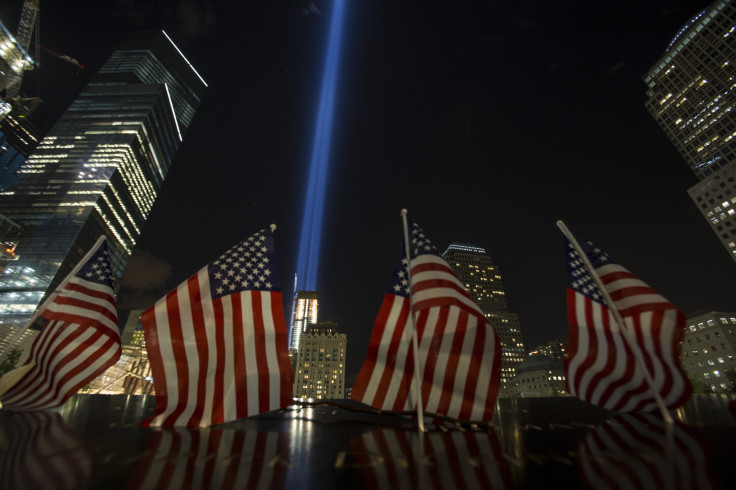The United States After 9/11: 7 Ways America Has Changed Since 2001 At 15-Year Anniversary
Sunday marks the 15th anniversary of 9/11.
For Americans who lived through the Sept. 11, 2001 terrorist attacks, the terrifying day is one they will never forget — one, like Pearl Harbor for previous generations, where you remember exactly where you were when the news hit. 9/11 forever altered both the course of American foreign and domestic policy, as well as the attitudes and awareness of Americans towards the Middle East and Muslims. Here are 7 ways America has changed since 2001:

Foreign Policy
Once terror group al-Qaeda was identified as the group responsible for the 9/11 terror attacks, then-President George W. Bush launched the War on Terror, ordering the invasion of Afghanistan shortly after. The philosophy that America must address terror threats militarily in the Middle East to prevent attacks at home has been a central pillar of American foreign policy since, informing every debate from the invasion of Afghanistan to the question of how to handle the Islamic State group and the Syrian civil war. Many also argue that fear of terrorism and Islamophobia in the U.S. fueled the country's decision to later invade Iraq despite shaky evidence that Saddam Hussein possessed weapons of mass destruction.
Politics
Before 2001, terrorism barely registered with most Americans as an important problem facing the country. After 9/11, counterterrorism became one of the U.S.' most important priorities. Following the terror attacks, 46 percent of Americans identified terrorism as the most important U.S. problem.
That acute focus on terrorism has bled into U.S. electoral politics. No presidential campaign since 2001 has been able to ignore the threat of terrorism when speaking with voters and debates between candidates have often been reduced to which candidate would be tougher and smarter in his or her counterterrorism efforts. GOP presidential nominee Donald Trump, for example, has often described fighting terrorism as one of his biggest priorities.
However, many argue the country has bigger priorities.
"Terrorism is a real threat," Vice President Joe Biden told The Atlantic in August. "But it’s not an existential threat to the existence of the democratic country of the United States of America. Terrorism can cause real problems. It can undermine confidence. It can kill relatively large numbers of people. But terrorism is not an existential threat."
Government Surveillance
In the aftermath of 9/11, Bush signed the Patriot Act, which was renewed in 2011 by President Barack Obama. The government also expanded the ability of the National Security Agency to collect data on U.S. citizens, foreign nationals and governments. Unknown to Americans until Edward Snowden's whistle blowing in 2013, the NSA was authorized under the Patriot Act to collect data from cell phones, email and corporations without a warrant. In June 2015, the USA Freedom Act severely limited the NSA's ability to collect phone data in bulk, but the NSA's massive surveillance operations continue amid great debate over their legality.
Immigration
U.S. immigration policy changed drastically with the Homeland Security Act and the Enhanced Border Security and Visa Entry Reform Act of 2002, according to the American Bar Association. Visas became harder to come by for tourists, students and foreign nationals and those who were admitted into the country were subject to further scrutiny as fingerprints and other biometric data was collected.
Immigration from Arabic countries continues to be a hot-button issue in 2016. Trump has called for a temporary ban on Muslim immigration to address the threat of terrorism and the vetting process for Syrian refugees has been under extreme scrutiny from critics on the political right.
The TSA
9/11 is the reason you have to take your shoes off when going through airport security. Shortly after the attacks, the federal government created the Transportation Security Administration (TSA) and, on Nov. 19, 2001, Congress passed the Aviation and Transportation Security Act. Under the law, the agency created regulations to prevent future attacks including more extensive security screenings and limitations on the amount of liquid and other items passengers are allowed to take on planes.
Airplane security also changed after 9/11, with the Federal Aviation Administration establishing policies to prevent the takeover of planes. Cockpits are now locked and only the pilot, from inside the cockpit, can unlock the doors.
Islamophobia
While 9/11 was certainly not the start of Islamophobia, a dislike of or prejudice against Islam or Muslims, in the U.S., it inarguably triggered a surge in anti-Islamic sentiment in the country.
In October 2001, an ABC poll found that just 47 percent of Americans had a favorable view of Islam. In 2010, 37 percent had a favorable view. By 2014, that number was down to 27 percent. To this day, anti-Muslim hate crimes in the U.S. spike after every major terror attack in the Western world.
TV Bad Guys
Before 9/11, the stereotypical bad guy in an action TV show or movie was a Russian. Resentment left over from the Cold War had cemented the nefarious Soviet operative as the archetypal villain in the world plotting to attack America. That changed after 9/11. As terrorism became the most urgent threat on many Americans' minds, the entertainment industry adjusted. Suddenly TV shows like the mega-hit "24" were centered around counterterrorism and young, Muslim males became the default criminal suspect. Many believe this shift has been instrumental in perpetuating Islamophobia in the country.
© Copyright IBTimes 2024. All rights reserved.












